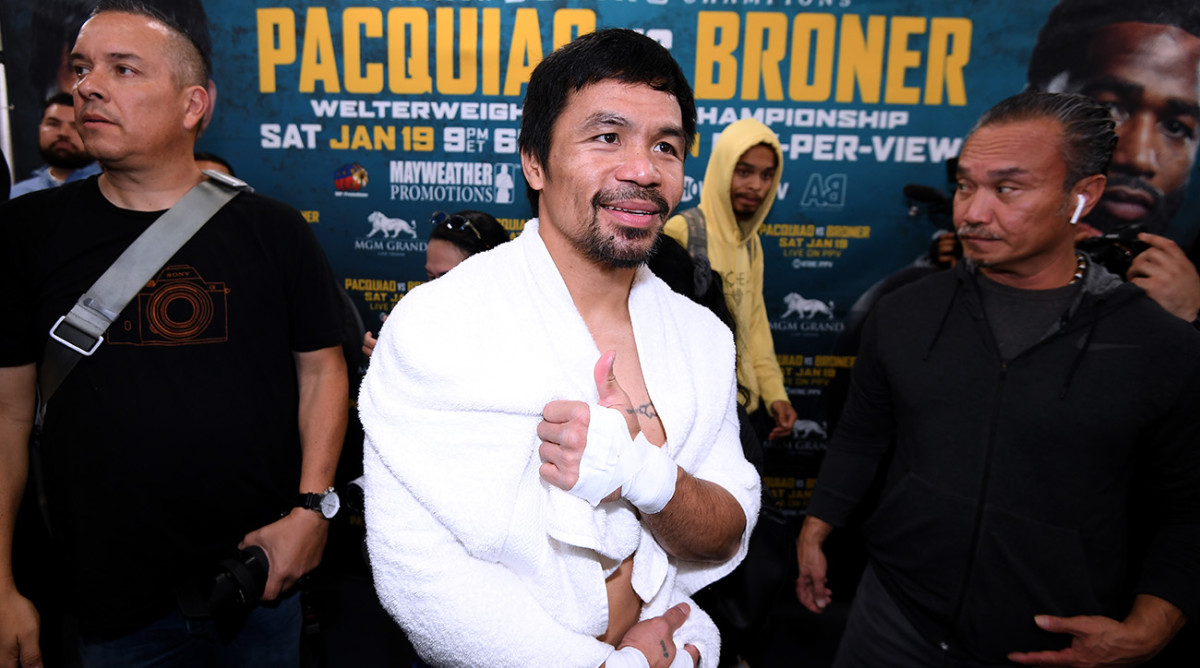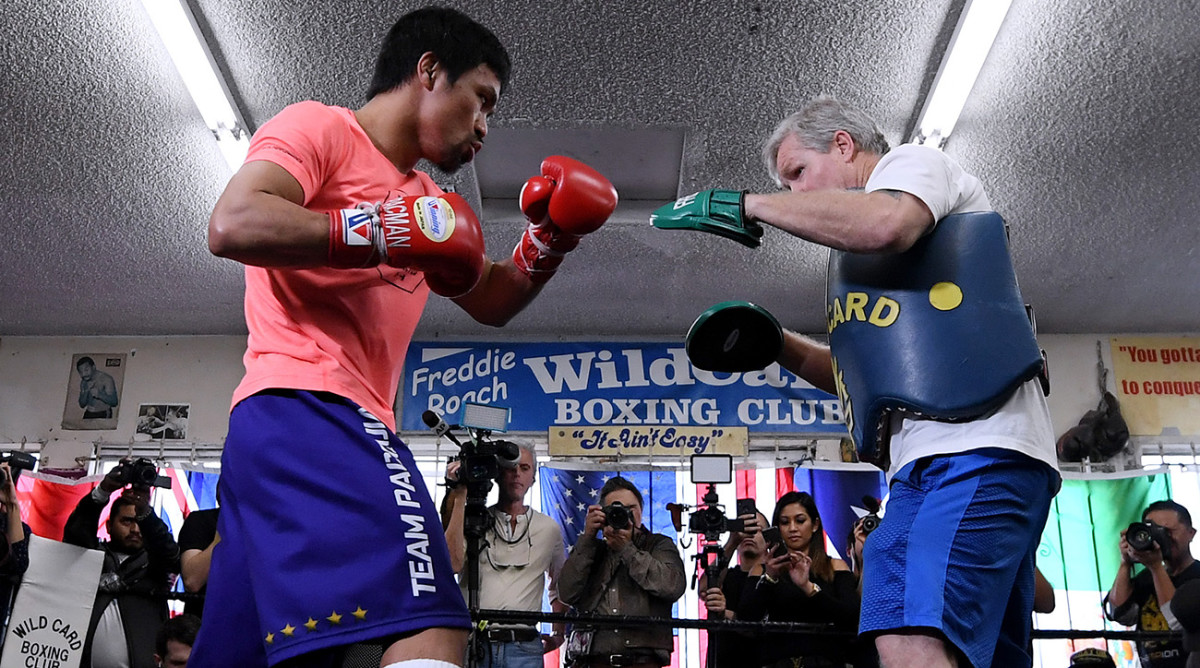With Nothing to Prove and Little to Gain, Why is Manny Pacquiao Still Fighting?

Why is Manny Pacquiao still fighting at age 40? What does he have left to prove? Hear the answer from Manny’s camp in Defiant: The Manny Pacquiao Obsession, only on SI TV.
HOLLYWOOD — Manny Pacquiao leans forward inside the downstairs locker room at the Wild Card Boxing Club. He’s pointing at his hair, specifically the random gray strands near his temples and behind his head. Proof, he says, that he turned 40 last December, and that he’s 24 years removed from his first professional fight.
Posters hang on the wall behind him. They’re for his next bout, on Saturday against Adrien Broner at the MGM Grand in Las Vegas (9 PM, Showtime PPV). Pacquiao wraps gauze and tape around his hands. He’s readying for sparring, his feet propped on a red stool.
There’s really only one question to ask him at this point. And it’s simple. Why? With titles in eight weight divisions, 60 victories, 69 fights, thousands of blows absorbed, the time in 2012 where Juan Manuel Marquez knocked him out cold, the happy family, the good life, the day job as a senator in the Philippines … with nothing left to prove and little left to gain, that’s the question, from now until The End. Why?
Pacquiao acknowledges that he has been boxing for more than 20 years. He says "the hunger is still there.” He says that nothing has changed. He says that he doesn’t feel lazy, that he wants to work, that he’s so addicted to exercise he pays people to play basketball with him for five-hour stretches. So, yes, he’s fighting for his bank account and fighting for his country. But he's also fighting for something far more simple and intrinsic. “People do not understand this,” he says. “But what’s inside me, athletes and boxers, they know. They understand. I want to keep on punching.”

Pacquiao held an extravagant party back in the Philippines to commemorate the birthday so many others dread. More than 3,000 people—friends, family, politicians, even the country’s embattled president—packed into a convention center. More than 3,000 others waited outside, hoping simply to catch a glimpse of him. When Pacquiao took the microphone, he told the crowd that public service was his mission but boxing was his passion. He never thought he’d fight until age 40—“never,” he says. But that’s the thing about passions. He also has not considered retirement. Not yet.
He leaves the locker room and climbs inside the ring, readying to face three sparring partners for a total of 10 rounds. This is his second such session since he landed in L.A., and there are moments where he looks sharp, like vintage Pacquiao; moments where he looks sluggish, like someone who just flew halfway across the world; and moments where he looks, well, like a boxer who turned 40 a few months back.
MANNIX: The Unlikely Reunion of Manny Pacquiao and Freddie Roach
The workout elicits all sorts of emotions for those who know Pacquiao, or even just those who like him and want to see him quit with his body and brain intact. There’s the hope that perhaps he can summon some of his old magic, countered by the concern that he’s even trying to, the risks being what they are.
Freddie Roach watches Pacquiao work from the ring apron, the same as he has, for the most part, since 2001. They did not work together for Pacquiao’s last fight, though, a knockout win over Lucas Matthysse last July, which marked the boxer’s first stoppage victory in almost nine years. After the fight before Matthysse, a loss to Jeff Horn that most observers thought Pacquiao actually won, Roach told his favorite fighter in the locker room that perhaps he should be a Senator or a boxer but not both. They have never since discussed that conversation, Roach says, but Pacquiao seemed to make his feelings clear when he didn’t hire Roach for the Matthysse bout.
Roach knows all about boxers and their stubbornness near The End. He retired at 27, four fights after his own trainer first suggested he call it quits, because he entered the ring that night wanting to survive rather than win. He’d never felt that way before. He knew. Roach has long said he’ll tell Pacquiao to retire when he thinks it’s time. But they haven’t had that conversation. Not yet. “If you told me at the beginning we’d still be doing this at 40, I’d would have said you’re crazy,” Roach says. But here they are.
The usual collection of onlookers catches Pacquiao spar, their cell phones put away, their eyes locked on the boxer. They’re looking for reasons to believe. Several of his children stand near the ring, along with his friends, his trainers, his assistant trainers, his fitness trainer, his manager, his old friends and even a guy in a green hoodie whose purpose no one can ascertain. Someone carries his water bottle; someone else, his Gatorade; someone else, his towel.
His calves look big, defined, sculpted. With Pacquiao that’s usually a tell, a sign that he’s ready. He long derived his knockout power from those calves, dipping and darting and striking from odd angles without warning. They flex as "Eye of the Tiger" plays on the gym’s stereo. Pacquiao grunts as he strikes a heavy bag. Yellow tassels flap from his black boxing shoes.
Pacquiao says he adjusted his training for the Matthysse fight, resting more, working just as hard when he did train, but listening to his body when he needed a break. Everyone who’s ever approached 40 can relate. The week before the fight he only went to the gym once and jogged every morning. “I learned a lot in that fight,” Pacquiao says. “I feel comfortable. I feel better. My condition is fantastic.”
Roach says, “He did prove a lot of people wrong, and he proved me wrong.”
The sparring ends. Pacquiao throws quick punches, his arms raised, for three minutes at a time. He dances to salsa music. He seems loose, relaxed. A member of his entourage says he will make $10 million for this fight, plus upside. He asks for silence, prays, then knocks out a few dozen knuckle push-ups. “It’s very difficult to give this sport up,” Roach says. “It’s very addicting.”

He’s asked who’s call that should be, and he says that trainers can usually sense the end before fighters do, but that the decision should ultimately be the boxer’s call. When Roach's trainer told him to retire, he told Eddie Futch that he was getting old. When Roach told James Toney to retire, he says Toney told him “to go fuck myself.” When he said the same to Bernard Hopkins, he says Hopkins told him, “You just lost your check.” One day, Roach says, he will say the same to Pacquiao, when he doesn’t see the same work output before a fight, or notices signs of physical diminishment. “If I live that long,” he adds.
He’s asked if he wants Pacquiao to retire, if he looks at the boxer’s family and his political obligations and might think it’s just time to say, no mas. “But the thing is, what does he do best?” Roach asks. “That’s box. He’s always going to go back to boxing.”
“This isn’t even close to being over yet,” Roach adds. “This is not the last one.”
MANNIX: Why Aren't More Major Fights Being Made in Boxing?
He’s right. The sense around Pacquiao’s camp is that if he beats Broner and looks good enough but not too good, then he will fight Floyd Mayweather Jr. once again, probably in May. That will depend both on how Pacquiao performs and how certain Mayweather is that he would win again.
After sparring, Pacquiao retires to his nearby mansion. Maybe 30 people hang out in the kitchen and the living room, nearby the painting of Pacquiao made to look like Bruce Lee and the staircase that features a series of framed pictures of knockout shots, one for each step. Security guards stand sentry outside. Dinner is served, then cake, while piano chords play over the sound system.
Pacquiao says part of him wants to keep boxing because when he fights his deeply divided country for a few hours is united. He’s asked if, like Hopkins, he might box until age 50. It’s no secret that he wants to become the president of the Philippines, opening the possibility he could become the first person to be a world champion and president of his country at the same time. Roach says it’s possible. Pacquiao just smiles. “Only God knows,” he says.
